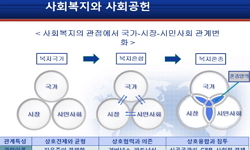The social enterprise startup ecosystem in Korea has had some positive aspects, such as the government's initiative to build infrastructure in a relatively short period of time and a significant increase in the number of social enterprises. However, t...
http://chineseinput.net/에서 pinyin(병음)방식으로 중국어를 변환할 수 있습니다.
변환된 중국어를 복사하여 사용하시면 됩니다.
- 中文 을 입력하시려면 zhongwen을 입력하시고 space를누르시면됩니다.
- 北京 을 입력하시려면 beijing을 입력하시고 space를 누르시면 됩니다.

IPA 분석을 활용한 사회적기업의 창업생태계 개선 및 활성화 방안 연구 = Research on ways to improve and revitalize the social enterprise startup ecosystem using IPA analysis
한글로보기https://www.riss.kr/link?id=A109744327
- 저자
- 발행기관
- 학술지명
- 권호사항
-
발행연도
2025
-
작성언어
Korean
- 주제어
-
등재정보
KCI등재
-
자료형태
학술저널
-
수록면
33-56(24쪽)
- 제공처
-
0
상세조회 -
0
다운로드
부가정보
다국어 초록 (Multilingual Abstract)
The results of this study showed that the order of importance for social entrepreneurs was: (1) consistency and predictability of government policies (4.72), (2) funding for each stage of growth (4.65), (3) startup support programs (4.64), (4) ease of survival after startup (4.62), and (5) a culture of re-challenge and acceptance of failure (4.57). The satisfaction (current level) rankings were as follows: 1) Startup support staff (3.31), 2) Startup support organization support (3.31), 3) Startup support program (3.20), 4) Startup support organization (intermediate support organization) capacity building (3.17), and 5) Sharing of know-how from senior entrepreneurs (3.13). When the t-test was conducted to analyze the differences in each sub-element of the social enterprise startup ecosystem, all sub-elements showed a higher importance than satisfaction, which means that social enterprise startup entrepreneurs perceive the satisfaction of the social enterprise startup ecosystem components to be very low compared to their importance. In addition, the factors with the highest improvement ranking in the importance-satisfaction matrix were testbed support, ease of market entry, social safety net in the event of a startup failure, ease of exit, a re-challenge ecosystem and a culture of accepting failure, ease of survival after startup, funding support for each stage of growth, and consistency and predictability of government policies. This study proposes improvements to the consistency and predictability of government policies, the creation of a re-challenge ecosystem and the acceptance of failure, the ease of survival after founding, the ease of exit, and funding support for each stage of growth to develop the social enterprise startup ecosystem.
The social enterprise startup ecosystem in Korea has had some positive aspects, such as the government's initiative to build infrastructure in a relatively short period of time and a significant increase in the number of social enterprises. However, there is a lack of consistency in government policies, the disappearance of the innovation inherent in social enterprises, and a lack of mid- to long-term strategies from the perspective of the startup ecosystem. In this study, the importance and satisfaction (current level) of each component of the social enterprise startup ecosystem were analyzed using the IPA analysis method for the most important stakeholders of the social enterprise startup ecosystem, namely, entrepreneurs (social entrepreneurs), to provide implications for the establishment of future social enterprise policies.
The results of this study showed that the order of importance for social entrepreneurs was: (1) consistency and predictability of government policies (4.72), (2) funding for each stage of growth (4.65), (3) startup support programs (4.64), (4) ease of survival after startup (4.62), and (5) a culture of re-challenge and acceptance of failure (4.57). The satisfaction (current level) rankings were as follows: 1) Startup support staff (3.31), 2) Startup support organization support (3.31), 3) Startup support program (3.20), 4) Startup support organization (intermediate support organization) capacity building (3.17), and 5) Sharing of know-how from senior entrepreneurs (3.13). When the t-test was conducted to analyze the differences in each sub-element of the social enterprise startup ecosystem, all sub-elements showed a higher importance than satisfaction, which means that social enterprise startup entrepreneurs perceive the satisfaction of the social enterprise startup ecosystem components to be very low compared to their importance. In addition, the factors with the highest improvement ranking in the importance-satisfaction matrix were testbed support, ease of market entry, social safety net in the event of a startup failure, ease of exit, a re-challenge ecosystem and a culture of accepting failure, ease of survival after startup, funding support for each stage of growth, and consistency and predictability of government policies. This study proposes improvements to the consistency and predictability of government policies, the creation of a re-challenge ecosystem and the acceptance of failure, the ease of survival after founding, the ease of exit, and funding support for each stage of growth to develop the social enterprise startup ecosystem.
동일학술지(권/호) 다른 논문
-
창업생태계 선진화를 위한 새 정부의 창업정책 우선순위 도출 : 정책 수요자 중심의 창업정책 제안
- 한국진로·창업경영학회
- 남정민
- 2025
- KCI등재
-
PBL 학습경험이 창업기회역량에 미치는 영향에 관한 연구: 학습만족도의 조절효과를 중심으로
- 한국진로·창업경영학회
- 김춘호
- 2025
- KCI등재
-
2021년 청년패널조사를 활용한 청년자영업자의 직업만족도 영향 요인 분석
- 한국진로·창업경영학회
- 김수진
- 2025
- KCI등재
-
환경공무직 근로자의 직업선택동기, 자아존중감, 직업정체성, 장기근속의도 간의 구조적 관계 분석
- 한국진로·창업경영학회
- 류세자
- 2025
- KCI등재




 KCI
KCI 스콜라
스콜라






